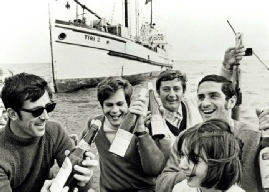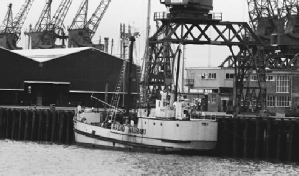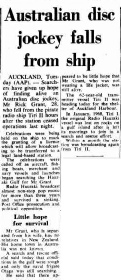© 2014-


Radio Hauraki - History (8)
That full hearing of the licence applications was held by the Broadcasting Authority on 27th January 1970 and lasted for 10 days, during which all applicants were closely questioned about their plans. The Broadcasting Authority's decision was made known on 24th March 1970 when it announced that Radio Hauraki had been granted one of the two licences for the Auckland area, with the other being granted to Radio International (Radio i).
Attention now turned to planning in detail for Radio Hauraki to start its broadcasts from land, something which up until that point had only ever been a dream. A decision was made to close the offshore operation at 10.00 pm on 1st June 1970, 1111 days after Radio Hauraki had started its broadcasts from the original Tiri. 
During the last three days of broadcasting from sea all programmes were presented live from the ship. Commercial airtime was sold at premium rates for those three days and 'thank you' messages were recorded by major artists, including The Beatles, Elvis Presley and The Rolling Stones for inclusion in the final programmes. After the station's final hour, which was an up-
However, during the Tiri II’s final voyage, in the early hours of 2nd June 1970, one of the station's most popular DJs, Rick Grant, was swept overboard. When the crew of the Tiri II realised what had happened to their colleague the alarm was raised and the radio ship, together with a Danish freighter en route for Auckland, searched the area all night, but to no avail. At first light a number of small fishing boats and three Navy vessels joined the search, but by midday rough weather forced the search to be abandoned. The Tiri II berthed in Auckland at 5.00pm that day, not to a triumphant flag-
was raised and the radio ship, together with a Danish freighter en route for Auckland, searched the area all night, but to no avail. At first light a number of small fishing boats and three Navy vessels joined the search, but by midday rough weather forced the search to be abandoned. The Tiri II berthed in Auckland at 5.00pm that day, not to a triumphant flag-
Work continued to build the studios and transmitter for the new land-
This challenge was met and at 6.00am on 26th September 1970 Radio Hauraki began broadcasting legally on 1480kHz from land-
After many changes in both format and ownership Radio Hauraki is still broadcasting today, a tribute to the work and dedication of David Gapes and those original backers who identified a need for such a station and found a way through a tangle of bureaucracy to achieve their objective.


Click on picture to enlarge
Crew celebrating the final day’s broadcasts from Tiri II
Photo: New Zealand Herald
Tiri II docks in Auckland for the final time

Canberra Times
3rd June 1970
Radio Hauraki opening as a landbased station, 26th September 1970
A short video history of Radio Hauraki containing interviews with the station’s founders and lots of contemporary news footage.

History
Key Dates
Ships and Location
Technical
Staff
Programmes









Treasure Chest


Back to Radio Hauraki

Back to New Zealand Gallery



